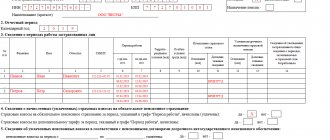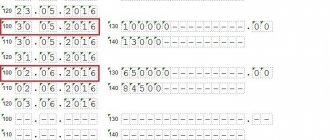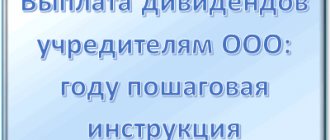Author: Maria Novikova
Internal regulations are approved at each enterprise. This document is considered a kind of instruction for employees, which spells out all the features of the work procedure - from the number of working hours to the procedure for calculating bonuses or disciplinary sanctions. Employees often violate these rules. What are the consequences of non-compliance with labor regulations for employees and are the employer’s actions legal in cases where violations are recorded?
What is labor discipline?
Labor discipline
is a set of rules developed by an enterprise in order to optimize the work process. It is based on the responsibilities of each employee prescribed by law.
Article 21 of the Labor Code of the Russian Federation “Basic rights and obligations of an employee
:
“The employee is obliged:
- conscientiously fulfill his labor duties assigned to him by the employment contract;
- comply with internal labor regulations;
- observe labor discipline;
- comply with established labor standards;
- comply with labor protection and occupational safety requirements;
- treat with care the property of the employer (including the property of third parties owned by the employer, if the employer is responsible for the safety of this property) and other employees;
- immediately inform the employer or immediate supervisor about the occurrence of a situation that poses a threat to the life and health of people, the safety of the employer’s property (including the property of third parties located at the employer, if the employer is responsible for the safety of this property).”
In addition to the basic requirements, labor discipline rules may also specify other responsibilities of employees related to the specifics of each organization. These include: compliance with corporate ethics, keeping trade secrets, insubordination, etc.
In case of a single violation of the regulations, a disciplinary sanction provided for by law may be imposed on the employee. Its type depends on the severity of the offense. The main violations of labor discipline include:
- non-compliance with labor safety rules
resulting in an accident at work; - absenteeism or systematic tardiness
; - showing up to work while intoxicated
; - immoral acts
; - theft
of work or personal property of employees; - intentional failure to fulfill duties or fulfill them not in full;
- falsification of legal documents
; - ignoring the orders
of the manager.
In private enterprises, the issue of choosing a disciplinary sanction is decided directly by the manager. Punishment is considered a manager's right, but not an obligation. Therefore, the employer independently decides on the advisability of imposing a disciplinary sanction. Systematic violation of labor discipline is considered as gross non-compliance with the rules and provides for more severe penalties, up to and including dismissal of the employee.
Article 189 of the Labor Code of the Russian Federation. Labor discipline and work routine
1. Labor discipline is an established order, without the maintenance of which it is impossible to ensure coordinated activity in the process of joint labor of employees of an organization (Part 1 of Article 189 of the Labor Code of the Russian Federation). Labor discipline requires employees to properly perform their labor duties as enshrined in Article 21 of the Labor Code (with comments and amendments), other federal laws and other regulatory legal acts containing labor law norms (see Article 5 and commentary to it).
2. The rules of conduct for employees during joint activities are determined by the collective agreement, agreements, as well as local regulations adopted by the employer (within its competence) in the manner established by Art. 8 TK. Local regulations include: internal labor regulations, job descriptions, shift schedules, etc.
3. The employment contract concluded with them serves as a regulator of employee behavior. A specific feature of an employment contract, which distinguishes it from civil contracts (contracts, assignments, paid services, etc.), is the employee’s subordination to the internal labor regulations established in the organization (compliance with working hours, technological discipline, timely execution of orders and instructions employer, etc.).
The essential conditions that make up the content of the employment contract certainly include the rights and obligations of the employee, the work and rest regime, if it differs in relation to this employee from the general rules established in the organization (see Article 57 and commentary thereto).
4. Part 2 of Article 189 of the Labor Code of the Russian Federation states that labor discipline is ensured by the creation of the necessary organizational and economic conditions for normal, highly productive work. Thus, the employer is obliged to provide work stipulated by the employment contract; ensure labor safety and conditions that meet occupational safety and health requirements; provide employees with equipment, tools, technical documentation and other means necessary to perform their job duties; pay wages on time; take care of the everyday needs of employees related to the performance of their job duties. If the employer strictly fulfills his responsibilities for organizing the work and life of employees (Article 22 of the Labor Code), there are no grounds for violations of labor discipline in the organization.
5. The internal labor regulations establish: the procedure for hiring and dismissing employees, the responsibilities of the employee and the employer, the organization’s operating mode, incentives for work and liability for violations of labor discipline.
The responsibilities of employees are formulated in the internal labor regulations in accordance with the provisions of Art. 21 (see commentary to it) in relation to the specific conditions of a given organization.
For the employer's responsibilities, see comment. to Art. 22.
The law does not establish any special requirements for the content of internal regulations. In each case, it is determined at the discretion of the organization itself. When developing internal labor regulations in an organization, the Model Internal Labor Regulations for Workers and Employees of Enterprises, Institutions, Organizations, approved can be used as an example. Resolution of the USSR State Committee for Labor in agreement with the All-Union Central Council of Trade Unions dated July 20, 1984 (Bulletin of the USSR State Committee for Labor. 1984. No. 11).
6. Along with the internal labor regulations in some sectors of the economy, there are charters and regulations on discipline that provide for increased requirements for certain categories of workers in these sectors (Part 5 of Article 189 of the Labor Code of the Russian Federation).
The need to impose higher demands on them is due to the fact that their violation of the established rules can lead to grave consequences. Thus, in the Regulations on the discipline of railway transport workers of the Russian Federation, approved. Decree of the Government of the Russian Federation of August 25, 1992 N 621 (SAPP RF. 1992. N 9. Art. 608), it is noted that it determines special conditions for compliance with discipline by railway transport workers, since its violation creates a threat to the life and health of people, traffic safety trains and shunting work, the safety of transported goods, luggage and entrusted property, and also leads to failure to fulfill contractual obligations.
This Regulation applies to all employees of railway transport organizations, regardless of their legal forms and forms of ownership. The exception is the categories of workers expressly listed in the Regulations. These are workers of housing and communal services and consumer services, labor supply systems, public catering on railway transport (except for employees of dining cars), medical and sanitary, educational institutions, etc. (clauses 1 - 3 of the Regulations).
In the Charter on discipline of employees of organizations with particularly hazardous production in the field of atomic energy use, approved. Decree of the Government of the Russian Federation of July 10, 1998 N 744 (SZ RF. 1998. N 29. Art. 3557), stipulates that the Charter establishes the responsibilities of employees of relevant organizations in order to ensure the safety of nuclear hazardous facilities and prevent unauthorized actions in relation to nuclear materials, nuclear installations and storage facilities for nuclear materials and radioactive substances, radioactive waste storage facilities.
The Charter applies to employees of organizations whose list is approved by the Government of the Russian Federation, as well as to employees of operating organizations that directly ensure the safety of nuclear facilities. Lists of positions (professions) of employees of organizations covered by the said Charter are developed and approved by the relevant federal executive authorities.
The Disciplinary Charter of the Customs Service of the Russian Federation, approved, applies to customs service employees. Decree of the President of the Russian Federation of November 16, 1998 N 1396 (SZ RF. 1998. N 47. Art. 5742).
7. When applying Article 189 of the Labor Code of the Russian Federation, it should be taken into account that the regulations and statutes on discipline are mandatory for all employees who are subject to them. Employers do not have the right to make any changes or additions to them. Some features relating to the labor regulations of employees who are subject to regulations and statutes on discipline may be provided for in the internal labor regulations of organizations, but they should not contradict the regulations and statutes on discipline.
Types of disciplinary sanctions and their application
Disciplinary sanctions are aimed at improving the quality and organization of work. Based on the employment contract, employees are obliged to strictly comply with all regulations, since in case of violation of labor discipline in accordance with the Labor Code of the Russian Federation, penalties regulated by law may be imposed on the employee.
Article 192 of the Labor Code of the Russian Federation. Disciplinary action
“For committing a disciplinary offense, that is, failure or improper performance by an employee through his fault of the labor duties assigned to him, the employer has the right to apply the following disciplinary sanctions:
- comment;
- rebuke;
- dismissal for appropriate reasons.”
A disciplinary violation will be considered an offense committed only through the fault of the employee
. The employer is obliged to demand compliance with all rules only if all conditions for this are provided at the enterprise. At the same time, each employee must be familiar with the work schedule, labor protection rules and his official duties, which is confirmed by his personal signature.
- Comment. The lightest punishment. A reprimand is imposed in cases of minor or one-time violation
of labor discipline. An oral remark is supported by a document indicating the essence of the offense and the employee’s explanation regarding the remark received. - Rebuke. Oral and written reprimands
are divided into forms .
When a reprimand is issued, an internal order is drawn up and entered into the employee’s personal file. There are severe reprimands
, which are issued for more serious violations and may be subject to material penalties and fines for the employee, if this is provided for by the company’s internal regulations. - Dismissal. This is an extreme measure of punishment for the offender. It is issued in cases of repeated or single gross violation
of labor duties by an employee. The legality of dismissal is regulated by law.
Article 81. Termination of an employment contract at the initiative of the employer
“An employment contract may be terminated by the employer in the following cases:
- repeated failure by an employee to perform labor duties without good reason, if he has received a disciplinary sanction.”
Article 192 of the Labor Code of the Russian Federation. Disciplinary action
“Disciplinary sanctions, in particular, include the dismissal of an employee on the grounds provided for in paragraphs 5, 6, 9 or 10 of the first part of Article 81, paragraph 1 of Article 336 or Article 348.11 of this Code, as well as paragraph 7, 7.1 or 8 of the first part of Article 81 of this Code in cases where guilty actions giving grounds for loss of confidence, or, accordingly, an immoral offense were committed by an employee at the place of work and in connection with the performance of his job duties.
When imposing a disciplinary sanction, the gravity of the offense committed and the circumstances under which it was committed must be taken into account.”
Disciplinary punishment can be issued on the basis of a memo
. If the employer considers this to be an insufficient reason, he can initiate disciplinary proceedings with the participation of the workforce. The result of the commission meeting will be an act with a decision on the type of disciplinary punishment.









